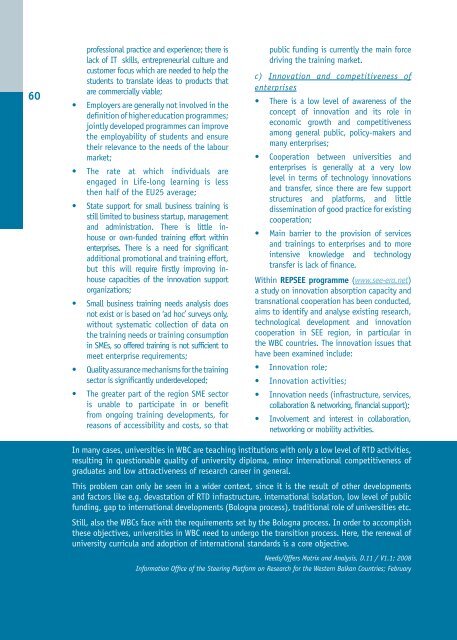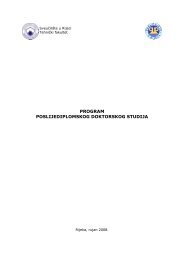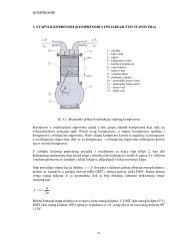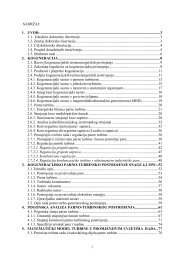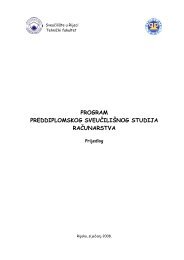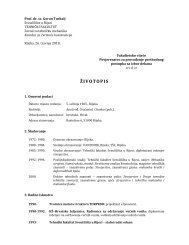universityâenterprise cooperation
universityâenterprise cooperation
universityâenterprise cooperation
You also want an ePaper? Increase the reach of your titles
YUMPU automatically turns print PDFs into web optimized ePapers that Google loves.
60<br />
professional practice and experience; there is<br />
lack of IT skills, entrepreneurial culture and<br />
customer focus which are needed to help the<br />
students to translate ideas to products that<br />
are commercially viable;<br />
• Employers are generally not involved in the<br />
definition of higher education programmes;<br />
jointly developed programmes can improve<br />
the employability of students and ensure<br />
their relevance to the needs of the labour<br />
market;<br />
• The rate at which individuals are<br />
engaged in Life-long learning is less<br />
then half of the EU25 average;<br />
• State support for small business training is<br />
still limited to business startup, management<br />
and administration. There is little inhouse<br />
or own-funded training effort within<br />
enterprises. There is a need for significant<br />
additional promotional and training effort,<br />
but this will require firstly improving inhouse<br />
capacities of the innovation support<br />
organizations;<br />
• Small business training needs analysis does<br />
not exist or is based on ‘ad hoc’ surveys only,<br />
without systematic collection of data on<br />
the training needs or training consumption<br />
in SMEs, so offered training is not sufficient to<br />
meet enterprise requirements;<br />
• Quality assurance mechanisms for the training<br />
sector is significantly underdeveloped;<br />
• The greater part of the region SME sector<br />
is unable to participate in or benefit<br />
from ongoing training developments, for<br />
reasons of accessibility and costs, so that<br />
public funding is currently the main force<br />
driving the training market.<br />
c) Innovation and competitiveness of<br />
enterprises<br />
• There is a low level of awareness of the<br />
concept of innovation and its role in<br />
economic growth and competitiveness<br />
among general public, policy-makers and<br />
many enterprises;<br />
• Cooperation between universities and<br />
enterprises is generally at a very low<br />
level in terms of technology innovations<br />
and transfer, since there are few support<br />
structures and platforms, and little<br />
dissemination of good practice for existing<br />
<strong>cooperation</strong>;<br />
• Main barrier to the provision of services<br />
and trainings to enterprises and to more<br />
intensive knowledge and technology<br />
transfer is lack of finance.<br />
Within REPSEE programme (www.see-era.net)<br />
a study on innovation absorption capacity and<br />
transnational <strong>cooperation</strong> has been conducted,<br />
aims to identify and analyse existing research,<br />
technological development and innovation<br />
<strong>cooperation</strong> in SEE region, in particular in<br />
the WBC countries. The innovation issues that<br />
have been examined include:<br />
• Innovation role;<br />
• Innovation activities;<br />
• Innovation needs (infrastructure, services,<br />
collaboration & networking, financial support);<br />
• Involvement and interest in collaboration,<br />
networking or mobility activities.<br />
In many cases, universities in WBC are teaching institutions with only a low level of RTD activities,<br />
resulting in questionable quality of university diploma, minor international competitiveness of<br />
graduates and low attractiveness of research career in general.<br />
This problem can only be seen in a wider context, since it is the result of other developments<br />
and factors like e.g. devastation of RTD infrastructure, international isolation, low level of public<br />
funding, gap to international developments (Bologna process), traditional role of universities etc.<br />
Still, also the WBCs face with the requirements set by the Bologna process. In order to accomplish<br />
these objectives, universities in WBC need to undergo the transition process. Here, the renewal of<br />
university curricula and adoption of international standards is a core objective.<br />
Needs/Offers Matrix and Analysis, D.11 / V1.1; 2008<br />
Information Office of the Steering Platform on Research for the Western Balkan Countries; February


